- Home
- Robert Graves
Proceed, Sergeant Lamb Page 4
Proceed, Sergeant Lamb Read online
Page 4
‘O what a wicked falsehood!’ cried his dutiful wife and daughters; ‘You were the; ringleader of the party, O fie! O fie! We saw you with our own eyes.’
‘This will cost you sixty dollars, young man,’ said the landlord very severely. ‘You see, there are witnesses.’
I turned to the landlord’s wife and asked in a smooth voice: ‘Can you tell me, Madam, for I have been long parted from my Bible by the accidents of war, which is the number of the Commandment—is it the Tenth or the Ninth?—which prohibits the bearing of false witness?’
Yet she was not abashed. ‘The Commandment prohibits only the bearing of false witness against a neighbour, and the Gospel makes it nation plain (in the chapter concerning the good Samaritan) that only he is a neighbour who does a man a friendly service. You have done us no such friendly service. You have come into our land to lay it waste and destroy our young men, as the Assyrians came into the Land of Israel; and I have neither love for you nor pity.’
‘Summon Sergeant Gershom Hewit, then, Madam,’ said I, ‘for he can call me neighbour, and he will testify that I am not culpable of these breakages.’
‘No, no,’ exclaimed the landlord, ‘you can’t escape us that a way. Neighbour Hewit, though he brot you here, is greatly obliged to me and would not injure my trade. The Commandment forbids the giving of false witness against a neighbour, but it does not insist that one should volunteer to give true witness even when called upon. Come, come, don’t be het up, but pay me my sixty dollars. Nay, I’ll be content with fifty, for the sake of peace.’
I could not by any means prevail on them to summon Sergeant Hewit, who had returned to his own house with a bruised head; for all were aware of the obligation under which Sergeant Hewit stood to me.
Now, I had four guineas in gold concealed in my shoes, each one of which was now worth at least fifty Continental paper dollars. Rather than be committed to jail and separated from my comrades, I would willingly have drawn on this hoard to pay the fine. Though the injustice was monstrous, the landlord had me in his power. Unfortunately, however, this way out was barred: once I discovered my hoard, the landlord would take it all away, and even make a virtue of his great benevolence in compounding with me for twenty odd dollars instead of fifty.
Fifty dollars in paper was not so stiff a price as appears at first sight, perhaps only double the value of the broken glasses. For the Americans had been dependent on Britain and Ireland for almost the whole of their glass-ware and crockery; therefore three years of war, and (before the war) the strong associations of colonists to avoid the use of English manufactured goods, and finally the rapid depreciation of the paper-currency, had sent up the value of the simplest household utensils from halfpence to dollars. Breakages were almost impossible to renew, and I may mention here that when General Gates, after the capitulation of Saratoga, had entertained General Burgoyne and his staff at a banquet, no more than four plates and two drinking-glasses could be found for this purpose in the whole American camp.
In short, I refused to pay, but told them that they were at liberty to take me to a magistrate where they might prove the crime against me if they could. There was a deal of whispering together among the men who had been engaged in the brawl with the artillerymen, and presently one of them came forward and asked me: ‘Say, you rascal lobster, kin you clip?’
I told him I was no barber, but he angrily bade me not to be witty at his expense. He then explained that he wished to know whether or no I was fleet of foot.
‘Is this a challenge?’ I asked.
‘No,’ he said very slowly, ‘not exactly a challenge, but a tarnal provocation.’
The mob guffawed at this rejoinder and it was now borne upon me that they had concerted to make me ‘run the gauntlet’ to the nearest magistrate’s house. Running the gauntlet, or gantlope, between the ranks of a regiment, of which each man was armed with a switch or strap, was a punishment lately borrowed from the British Army by General Washington for introduction into his own; together with the more formal punishments of flogging and riding the wooden horse. The last-named very painful punishment (which consisted of setting the offender a-straddle upon the edge of a board six feet above the ground, with muskets tied to his feet) was only awarded for serious offences, such as horse-stealing and desertion. General Washington discarded it, in the end, because of the permanent injuries it often occasioned; but by permission of Congress, the legitimate allowance of stripes in flogging was at the same time raised from the Mosaic limit of thirty-nine to that of five hundred—though, I believe, seldom more than two hundred were awarded. Running the gauntlet, which combined entertainment with castigation, was the sentence usually inflicted throughout the American forces upon soldiers who failed in their duty. The whole regiment being made the executioner, the drummers were relieved of the peculiar odium which their disagreeable duty as floggers brings upon them in every army; and there was also this advantage, that the criminal was left to the mercy of his comrades, who laid on lightly or heavily according to their estimation of the gravity of the crime and his character as a soldier.
I was kindly excused the precaution usually taken to ensure that the victim did not escape lightly, viz. a sergeant with a bayonet placed at the runner’s breast walking slowly backwards to check his pace. They took me to the tavern door, and pointing out the magistrate’s house at a hundred yards’ distance down the hill, which was conspicuous for an American flag flying from a staff, ‘There, damn you,’ one cried, ‘Look at the Stripes of Liberty!’ Presently their leader gave me the word ‘Go!’ I instantly darted off. I was young and active and the slope accelerated my pace, so that I received but few blows, though a score of people, armed with hickory sticks, aimed to strike me as I passed.
The magistrate himself, a red-faced man wearing a monstrous corn-yellow wig, was on the stoep, or raised platform, which surrounded his house; he appeared to be enjoying the fun very heartily. As I leaped into the sanctuary of his parlour, he pretended surprise at my unceremonious haste, and asked me gruffly, where were my manners? The landlord soon arrived, carrying the broken glasses on a tray for a testimony against me, and claimed the fifty dollars from my pocket. But he said: ‘Come now, I swear I’m a merciful man. I’ll accept forty, and that’s dog-cheap.’
The magistrate called me a rogue and a common brawler and, without hearing my defence, threatened me with the hulks at Boston, where I should be fed on bread and water, did I not instantly pay. I persisted in declaring that I had no part in the outrage and challenged any person to come forward and prove it against me, demanding fair play. I observed that I had evidently raised a scruple in the conscience of the landlord’s wife and daughters: for they did not venture to swear against me. Yet, the landlord himself being very insistent, the magistrate rejected my plea and repeated that to the hulks I must go, unless I laid down the mulct upon the table.
Then I said: ‘As for the money, Sir, you cannot either by squeezing or threats get blood from a flint, or coin from a pauper. You are at liberty to search my pockets, and take what you find, but more cannot be effected. I have always understood the folk of Massachusetts to be a reasonable people.’ Then I produced two dollars in Continental paper and an English sixpence, all of which I laid upon the table. ‘As for sending me to Boston, that will only cause you trouble; nor will it pay for the drinking-glasses, which (I repeat) I did not break; and so Sergeant Gershom Hewit, who owns himself under an obligation to me for the saving of his life, would be glad to testify, were he summoned.’
The magistrate, I judged, was chary of offending Gershom Hewit. After some consultation among themselves, the matter was arranged to the general satisfaction. The price of the glasses was to be made up by a voluntary contribution of the whole company, who demanded in return the pleasure of striking at me once more, having succeeded so ill on the former occasion.
I was therefore brought to the door and held by the magistrate and his sons until my enemies were each man posted between the house and the Westborough ro
ad, all prepared to strike me. The magistrate asked for the word ‘ready’; and when they gave it I was let go. Once more I darted along the line, though the ground did not favour me as before; and despite that the number of my assailants was greatly increased by the news of my arrest, which had spread through the town, I did not receive in all more than a dozen blows. Their confusion and eagerness to deal strokes upon my unprotected head spoilt their aim, and I dodged, checked and ducked with an agility that surprised even myself. They did not pursue me after I had gained the road and by rapid marching I was enabled to join my companions. However, I felt my body and head sore for many days afterwards.
CHAPTER III
On our arrival at Rutland, ten miles beyond the township of Worcester, we found no preparation made for us. In a region of forest remote from any houses, we were given axes with which to fell a great number of trees, and to cut pickets from them of the length of five and twenty feet, sharpened at either end. These pickets we were then ordered to drive firmly into the earth, very close together, so that a pen was made enclosing a space of two or three acres. Only when this was accomplished were we allowed to build log huts for our shelter and accommodation; to procure boards for which we must fell more timber and convey it to a saw-mill some miles away. We were, however, allowed a few nails for our carpentry. For chairs we were content to use tree stumps or round blocks; two blocks with a plank laid over made a table; pegs served instead of cupboards.
At one angle of the pen a gate was erected and outside the gate stood the guard-house. Two American sentinels were constantly posted here and no one could go out unless he had a pass from the officer of the guard; but this was a privilege in which few were indulged, except for the felling and transport of timber. Other sentinels stood at convenient distances around the pen, armed with loaded weapons. Our provisions were rice and salt pork, delivered with a scanty hand, nor could we obtain any drink but water, unless we paid a high price to the guards. The favourite liquor in these parts was cider.
American agents were very active in attempting to procure our desertion; but little attention was paid to them except by the worst soldiers. It will not be found surprising when I relate that Brooks the Dipper was seduced from his duty. He was tempted to sell himself as substitute for a hatter of Danbury, but soon deserted the Connecticut militia regiment to which he was posted and escaped back into the State of Massachusetts, where he was safe from apprehension, and there went to live as servant with a private family. Corporal Buchanan also left us, never to return. He had been appointed sergeant to fill a vacancy that had occurred and given money by his officer to provide shoes for the company; for he had been a cobbler before his enlistment. His pass took him as far as Worcester, where leather was to be bought, and there he bundled with a young woman at an inn, and was tempted to carnal intercourse with her. She agreed not to cry out ‘rape!’ only when he undertook to give her all the shoe-money. Apprehensive of punishment if he returned empty-handed, he went away to the town of Taunton, which lies about forty miles to the south of Boston; where he obtained employment at a shoemaker’s and was set to do bespoke work, the customers bringing leather to the shop to be made into shoes. From his wages, and from the sale of children’s shoes and whangs from the leather left over from the bespoke tasks, he contrived in six months to save a considerable sum of money. Thereupon he sent a letter to a man of the same trade as himself in the Fourteenth Regiment, urging him to desert and proposing that they should set up together in business on their own. But though Sergeant Buchanan painted the pleasures of freedom and employment in very lively colours, the man remained faithful.
In this pen we continued without employment or sufficient food, the Americans evidently intending to encourage our desertion by this means; but it was constantly impressed upon us by our officers that Congress would in the end be obliged, for the public honour of the nascent American Republic, to fulfil its obligations by our release. We therefore continued patient. Our sufferings were aggravated by a decision of General Sir Henry Clinton, who had superseded General Sir William Howe in the command of the Forces in America, no longer to send us our pay in specie. His view was that so much coin as was due to us should not be put in circulation among the Americans, who would use it for purchasing arms from France; and that this would be an inducement to them to detain us longer. Many persons from the Southern states, where Congress money was less regarded even than here, had journeyed up to our camp at Prospect Hill for the purpose of exchanging paper for coin. They had to act cautiously, for the transaction ranked as treason. Two German officers, about this time, very unkindly informed against a Virginia merchant who would not give them for their guineas as much paper as they demanded; and had him packed off to prison! Thus we suffered for the public good, and the paper money issued to us was so unwelcome to the Americans, because of its daily depreciation, that though they did not dare to refuse it, they informed us either that they had nothing to sell of what we needed, or that our money was counterfeit. It must here be observed that an immense quantity of well-counterfeited Congress notes had been printed in New York by American loyalists, and widely scattered in Revolutionary territory to undermine public faith in the genuine issue, already tottering. The paper that we tendered was therefore naturally suspect as being supplied to us by the Paymaster in New York.
We amused ourselves with boxing matches, leap-frog, races, and with card-playing so long as our worn packs held together; and also undertook theatrical performances of Shakespeare, for which I was frequently selected, as gifted with a good memory, to take principal parts. My greatest hit was as Edgar in the Tragedy of King Lear and I remember the hearty laugh that went up when it fell to me to complain of hunger in that character, being in one scene disguised as a ragged Tom o’ Bedlam: how ‘rats and mice and such small deer, Have been Tom’s food for seven long year.’ This touched a responsive chord, for we eked out our provisions with all manner of small birds and animals which we snared. And it was notorious that I had been badly bitten in my left hand, which festered, by a flying squirrel which I had tried to catch for the pot. And also: ‘Hopdance cries in Tom’s belly for two white herring. Croak not, black angel: I have no food for thee.’ What would we not have given for a well-cured Dublin herring!
Jane Crumer was a popular actress and once played Desdemona to my Othello. She was, besides, the object of universal admiration and pity for the constancy which she showed to her husband. This poor fellow had indeed recovered bodily health after the head-wound he received in the fighting at Freeman’s Farm, but though still a fine-looking man and a Hercules in strength was by that blow left for the remainder of his life a poor puzzle-witted innocent, unfit for any but the simplest field labour. Mrs. Jane was better off for money than most of us. To reward her services at Saratoga in fetching water from the river, the wounded officers who had benefited from her gallantry had thrown money into her lap to the amount of no less than twenty guineas.
In the course of this summer we became very familiar with the beautiful birds of the country, which we encouraged to visit us by scattering crumbs: the cardinal bird, the feathers of which were as scarlet as a new uniform coat; the blue bird, a sort of small jay, which united in its plumage all the various shades of blue from the pale-blue of early dawn to mazarine and the Royal blue of silken facings; the fire-bird which was of pure flame colour; and the hanging bird whose plumage of orange was variegated with black. Jane Crumer was given by a sentinel a nest of the hanging-bird, which resembled a hornet’s nest and was suspended by hemp stalks from the extremity of a bough. The young ones proved very tractable and she taught them a variety of tricks. They would take crumbs from her lip, chirp in unison, cease at a signal, and even ‘die for their country’. There was also a bird which the Americans called a robin on account of his rufous breast, but which was three times the true robin’s size, and songless. These birds were greatly inferior in song to those of Ireland: we heard no twittering exultant lark, no plaintive nightingale, no me
lodious thrush. As for the bird which they called a blackbird and which was of the size of our blackbird, but with a collar about his neck of iridescent blueish feathers, I took a great dislike to the species. These birds had no sweet fluting song but made a harsh disagreeable noise which caused them in some parts of the country to be named ‘grackles’; they were great thieves, and tyrants to lesser birds, besides being disgracefully lecherous.
A pair of grackles had a nest in a tree on the other side of the pen when we first came, and a sentinel one day shot the cock-bird for sport. This we at first thought wanton, but the widowed hen, by some means which we could not determine, called a new cock-bird to her but a few hours later, who entered into all the duties and privileges of the conjugal state. The sentinel thereupon shot this cock too, and lo, the next morning the undisconsolate widow had found a third mate. Seven cock-birds this same sentinel shot and each time the hen-bird mysteriously summoned a new one from the skies. ‘Last of all the woman died also,’ remarked this waggish New Englander, quoting from the Gospels, and this time discharged his small shot at the hen herself. He killed her, but the body hung suspended upside down by the claws to the bough where she was sitting. Even in death she did not lose her attraction for the opposite sex; but two days later, when her body was already decaying, a new cock appeared and began to puff out his feathers and strut and go ‘grackle-grackle’ at her, in the manner which we had observed in the previous courtships of this very promiscuous bird.
Being distant from any township, we saw no fruit trees in blossom, which was the great beauty of Massachusetts in the Spring, but hard by the gate there grew a beautiful dogwood tree, a sort of white rose-bush, having at first more flowers than leaves, and highly ornamental. The wood of this bush or tree was very hard and fibrous; we used it for tooth-brushes. Branches of dogwood were tied about the necks of cattle in the summer, for a virtue it possessed of reviving them if they were exhausted by the heat of the sun. The flowers lacked the odour that might be expected of their beauty. Indeed, as the birds were in general without song, so the flowers were in general without smell. Once the orchard blossoms had gone, there was no more to expect in the flowery way. Summer in New England had no shepherd’s rose or honeysuckle, just as Spring came and went without primroses, cowslips, bluebells, daffodils or daisies.

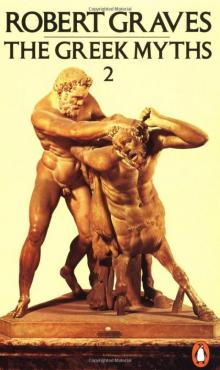 The Greek Myths, Volume2
The Greek Myths, Volume2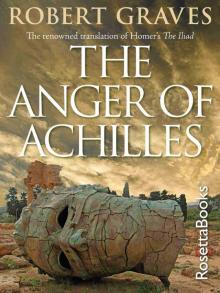 The Anger of Achilles: Homer's Iliad
The Anger of Achilles: Homer's Iliad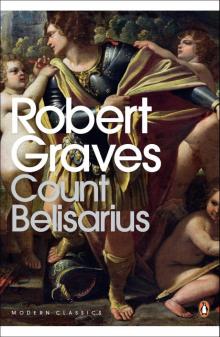 Count Belisarius
Count Belisarius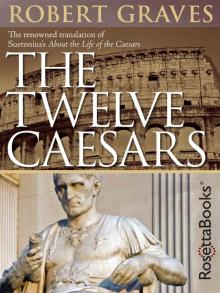 The Twelve Caesars
The Twelve Caesars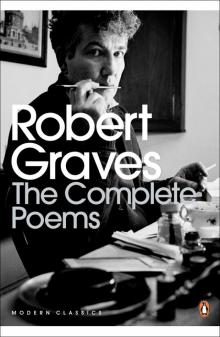 Complete Poems 3 (Robert Graves Programme)
Complete Poems 3 (Robert Graves Programme)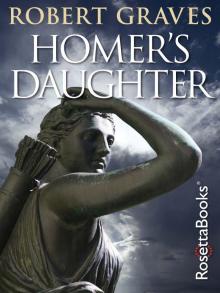 Homer's Daughter
Homer's Daughter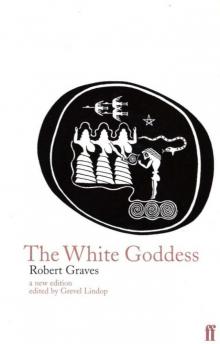 The White Goddess
The White Goddess Goodbye to All That
Goodbye to All That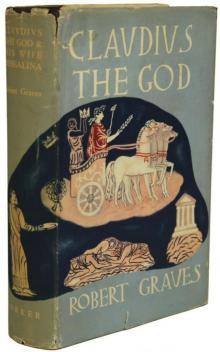 Claudius the God and His Wife Messalina
Claudius the God and His Wife Messalina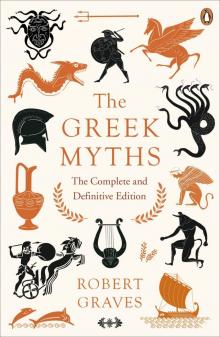 The Greek Myths
The Greek Myths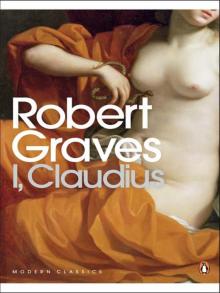 I, Claudius
I, Claudius The Islands of Unwisdom
The Islands of Unwisdom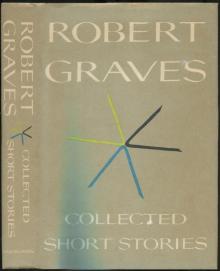 Complete Short Stories
Complete Short Stories The Golden Fleece
The Golden Fleece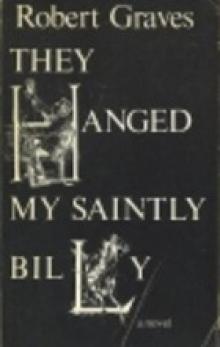 They Hanged My Saintly Billy
They Hanged My Saintly Billy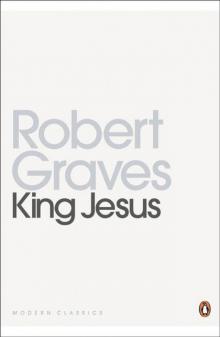 King Jesus
King Jesus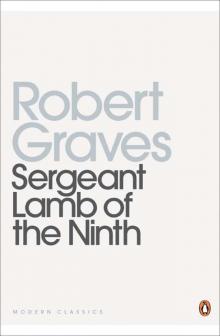 Sergeant Lamb's America
Sergeant Lamb's America Hebrew Myths: The Book of Genesis
Hebrew Myths: The Book of Genesis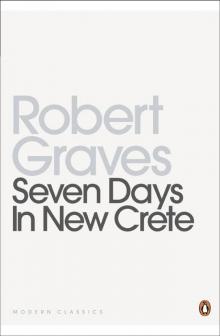 Seven Days in New Crete
Seven Days in New Crete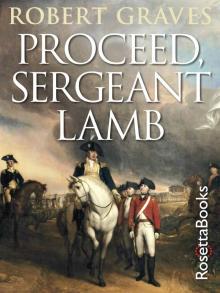 Proceed, Sergeant Lamb
Proceed, Sergeant Lamb Claudius the God
Claudius the God Wife to Mr. Milton
Wife to Mr. Milton The Complete Poems
The Complete Poems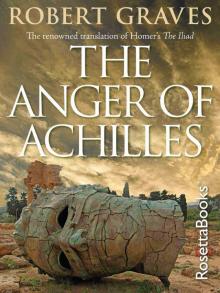 The Anger of Achilles
The Anger of Achilles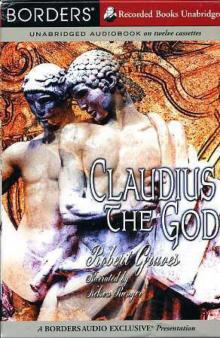 Claudius the God c-2
Claudius the God c-2 Hebrew Myths
Hebrew Myths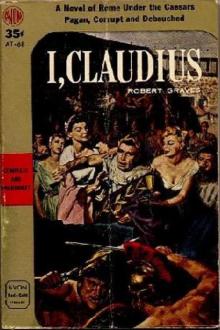 I, Claudius c-1
I, Claudius c-1 The Greek Myths, Volume 1
The Greek Myths, Volume 1